- Home
- Barbara Metzger
My Lady Innkeeper Page 4
My Lady Innkeeper Read online
Page 4
“He’ll die. Infection or chokin’ or starvin’ when he can’t swallow no more. It’d be kinder to end his sufferin’ right now. I’m sorry, laddie,” he told Sam’l, “but you can’t want him to go on hurtin’ so bad, now can you?”
Lyndell couldn’t see the boy’s face, his chin tucked so tight against his collar, but she saw his head shake, then a tear fell on his scuffed and ragged boot-top. What about the boy’s suffering?
“Not yet, Benny. We can give it a few more days, can’t we? He’s not sickly and he’s eating fine and—you saw—he almost let me pet him. I can keep trying, bringing him treats, talking to him. Maybe he’ll let me work on the rope tomorrow, or the next day. What do you say?”
“I say you never listened to me about tryin’ to fix a busted sparrow neither.” He pulled a handkerchief from his pocket and turned away to blow his nose.
Lyndell was finding it a little hard to swallow herself. She cleared her throat before telling Bennett and Sam’l she had to see about writing a letter for the butler at King’s Mark.
Chapter Six
Lyndell was driving Jasper’s curricle, wearing her green cloak. “Felicity” was sitting beside her, wearing the decrepit squirrel shawl and a frown. She couldn’t quite see why, if she couldn’t wear her ermine cape because a maid wouldn’t, she couldn’t flirt with the egg-man, which a maid would. Lyndell was dizzy from trying to explain how pretending to be a serving girl had nothing to do with acting like a lady. She almost thought she was doing the Marquis of Cheyne a favour.
For now she had to push Felicity’s problems to the back of her mind. There was the dog, and there was Jasper— where was Jasper?—Molly, and this Captain Drew Jamison at the Southwold Barracks, the one who was investigating the murdered courier. How much of Jasper’s letter could she reveal? For that matter, how unentangled was Jasper in the whole affair? On reflection, she realised that she had only his word that he knew nothing of Quinn’s doings, and Jasper’s word was something less solid than Stonehenge. So what was she doing here, driving the sorriest nags she’d ever been behind—trust Jasper to own retired plowhorses— over slush-covered roads that she couldn’t even see? She snatched the benighted spectacles off her nose and threw them into Felicia’s lap.
‘Take these,” she said, “and remind me to put them on when we arrive.”
The reminder of Lyndell’s own sacrifices seemed to moderate Felicia’s indignation. She brightened up, under the dreadful grey shawl, and began questioning her dear Lyndy about “the Season.” If Lyndell had ever been that eager she certainly couldn’t recall it. Of course, she’d never been as sheltered as Miss Fullerton; she had attended small parties well before she was officially “out,” becoming accustomed to Society from her earliest days. Maybe that was why she was so ... well, jaded was the word she thought of, so bored with Society. Maybe she should retire to Suffolk permanently, and grow roses (which made her sneeze). Maybe she should just reconsider Isabelle’s advice about a comfortable hus—
“Halt, who goes there?”
* * * *
Captain Jamison took thirty minutes to decide to see Miss Lynn Riddley. During this time she sat in the carriage, chilled, impatiently tapping her foot on the floorboard, while Felicity/Felicia smiled at every passing soldier, and every soldier in the whole fort found a reason to inspect the carriage and its dainty occupant. Felicity was adorable, despite the shawl, which she managed to slip off her shoulders, baring enough to the chill air to raise goose bumps on the pink flesh. The black of her uniform, crisply pressed again, hemmed and gathered by Mrs. Bennett to mould the plumply rounded figure, well became the girl’s rosy colouring. The blond curls, which neither Lyndell nor Felicia had been able to manage creditably, were gathered up onto Felicia’s head with a scrap of black lace ribbon from one of Lyndell’s petticoats, letting the ringlets fall down her back. Not quite right for a lady’s maid, but extremely pleasing to a handsome young corporal begging to know where such a lovely flower had sprung from. Lyndell had the dreadful thought that Felicia might mention the King’s Pass Inn by name, filling the tavern with panting soldiers. Lyndell’s vivid imagination could see Bennett beating them off with his log while Molly got rich. Not a moment too soon, Lyndell kicked her companion soundly on the ankle, causing that young lady to blush and finally lower those blue eyes. Miss Riddley, at her own haggish worst, froze the soldier with a daunting grimace through the distorting lenses.
Then a young private, a boy really, stammered to Felicia that the captain could see her mistress now. The rush to hand Felicia down could have routed the French years earlier. Miss Riddley had to accept the reluctant hand of what looked like the company cook. At least his stained apron suggested that, though why he’d be standing near the gate was beyond her. If this was how the army was run, no wonder secrets could be stolen ... unless caution was much relaxed now that the war was finally over and these men would soon be civilians. No matter. She firmly gripped Felicia’s upper arm and pulled the girl along with her after the private.
Captain Jamison greeted them in an anteroom, buttoning his uniform jacket, with effort, over a low paunch. His eyes gave Miss Riddley the merest glance at the introduction, straying to Felicity for a thorough look. While he was thus discourteously occupied, Lyndell conducted her own investigation, over the spectacles’ rims.
Jamison was fortyish, one of those gentlemen who try to act younger and succeed in seeming older, or foolish. He had thin blond hair of a wishy-washy colour, combed into a wish-he-had-more style, streaky bands pulled across his head and spread out to cover more territory. His eyes, travelling up and down Felicity’s charming figure, were dampish, with disappearing white lashes. There were crumbs in his yellow moustache. Altogether Captain Jamison was not Lyndell’s ideal picture of an English officer.
When she explained that her mission was of a private, delicate nature, he gruffly gestured her to the inner office. Lyndell pushed Felicity into one of the outer chamber’s two chairs and whispered as forcefully as she could, “Sit there and do be quiet.” She gave a last vicious look to the young private, who reddened and then fled outside, before she followed Jamison, shutting the door behind her.
Jamison was already at his desk, lighting a cigar with brown-stained fingers. He impatiently waved the foul item in the vague direction of a chair, then sat down. If she’d come as Miss Lyndell Markham, she thought, this pompous little twit would be hopping up and down, offering her wine or tea or the best seat and hanging on her every word. There was a lesson to be learned there, Lyndell realised, one she would have to consider seriously at a later point, a moral she knew would be good for her soul. Right now, however, the lesson she was learning—had learned quite well already—was that she enjoyed being Lyndell Markham far more than she did being Miss Lynn Riddley! This afternoon, however, she had to be plain—Lyndell chuckled to herself at that double-edged word—Miss Riddley, with no authority and no right to demand courtesy. She was simply Jasper’s spinster sister, come to see if she could help clear her brother’s name.
“No, no, ma’am, there’s nothing you can do ... unless of course you know where Riddley might be right now. My superiors were not pleased with his disappearing.”
“Is ... is he suspected of anything?”
“There’s no certain proof. They merely want to talk to him.”
“His nerves were so overset by this whole situation, he had to take a repairing lease. His health, you know, has always been delicate.”
The captain picked at his fingernails with a penknife. “No, I didn’t. Frankly, ma’am, I don’t see what you’re doing here. If Riddley has nothing to hide, he should be out in the open. If not, he’s well out of it. So why don’t you just go back to where you come from and let us handle it.”
Of all the patronising pap! He may as well be patting her on the head, while fitting Jasper for a hemp necktie! “Sir, I feel I’d do better at the inn waiting for the London gentleman Jasper mentioned as having some connexion with the mess
enger who was murdered.”
Jamison gave her a hard look. “A London gentleman, eh? He didn’t speak of it to me before he loped off. What else did he happen to mention?”
“Why ... why nothing else. Just that a murder was committed, secret documents were involved, and you were questioning him. That must mean you suspected the inn was involved. But it was the Quinns who ran off—”
“Aye, the Quinns. Let me tell you, Miss Riddley, the Quinns may have had more to hide than your brother. Maybe not. But Mrs. Quinn was found drowned up near Yarmouth this week. Maybe in a scuttled smuggler’s boat trying to escape to France, and just maybe made to look like a drowning by someone who didn’t want her talking.” He held up three fingers of one hand, fingernails still dirty, Lyndell noted, even in her horror. “Maybe that someone was Quinn”—he bent down the first finger. “Maybe your London gentleman.” The second. “And maybe your precious brother Jasper.”
She gasped, but he went on, brutally: “I’m not saying what I suspect, but I am saying it’s no place for you. Traitors don’t sit around drinking tea, ma’am, and reading sermons. And murderers, two-time murderers, don’t care much for manners! So go do your good works, lady, somewhere else.” His voice had raised to a bellow at the end, but Lyndell did not flinch.
“Jasper is not a spy. Nor is he a murderer.” She stood in quiet determination. In some belated regard for the amenities, Jamison stood also. His efforts at placating her having failed, and his attempt to frighten her away as well, he gave up in exasperation. “Very well, go back to your flea-ridden inn and wait for your Town nob. Send me a message if you find any proof.”
“Thank you, Captain, I’ll certainly do that.”
She extricated Felicia from a knot of soldiers—someone had offered her tea—and stalked out to the waiting carriage. The captain handed her up, then Felicia, who turned to wave gaily back at her new admirer.
“Abominable girl! Don’t encourage them. Especially not that despicable Captain Drew Jamison.”
“Isn’t he though? He even pinched me on the way out.” Despite all the turmoil raging in her head, Lyndell still had an ounce of pity to spare for any man unfortunate enough to marry this brazen chit. She snapped the reins to get her team to a steady gait, one just possibly faster than she could walk, and removed the eyeglasses as soon as the Southwold gates were behind her.
* * * *
Even before Miss Riddley had her back to him, Captain Jamison stomped to his office, shouted for a messenger, stubbed out his cheroot and scrawled a note:
“Jasper Riddley’s sister here, asking about London gent. Advise.”
Chapter Seven
Lyndell was depressed. Things were going from horrid to hellish. She could have done Jasper as much good by staying in London! And then she wouldn’t have involved her dear friends the Bennetts in this maelstrom. Nor would she have encouraged Felicia to stay where the girl’s very life might be threatened. As for the boy and the dog and this wretched inn, how in the world did she get to be responsible for all of them?
She’d returned from the visit to Jamison at another cloud-early dusk, to a scene of perfect tranquillity. Bennett and Sam’l were counting harness, the boy nodding as Benny slowly and clearly gave each a number. Mrs. Bennett was at the kitchen table, her pots bubbling on the stove, stitching new curtains from the fabric Joseph had fetched back from Entwood, the nearest town. Tiny red roses on a cream background. Another murder, and Sarah was sewing curtains! She already knew about the murder, it seemed, gossip in Entwood being full of that. No one had actually blamed Jasper, Bennett had reported, but everyone was wondering where he was, that was certain!
“Tongues running on wheels, I’d wager. But why shouldn’t I be making new hangings? It’s no great expense, and’ll make the place ever so much more homey. If we decide to leave, why, the new people will have a friendlier welcome. And as for the boy, he’ll need to count just as well in Islington, now won’t he?” Sarah looked so content, so sure the world was a good place for her and hers, Lyndell hadn’t the heart to argue.
She took a bowl of chicken scraps set aside for the dog, and tried that futile task once more. Ajax let her approach, and even licked her fingers. But when she attempted to bring the knife toward his neck, he lurched away. He didn’t try to snap at her and wasn’t growling so loudly; he would not let her touch him, however. She was hesitant about trying again, not for fear of being bitten anymore so much as of injuring the dog worse with the sharp knife if he continued the sudden moves. He ate the chicken, but he held his head to one side, stiffly.
Sam’l was watching her face intently for a sign of hope, and she had none to give him. She placed a dry blanket under the dog’s bench.
Dinner was a dismal affair, despite Sarah’s chicken pies. Lyndell had tried to convince Felicia to return home. It was just too dangerous here, she told the girl, without, for Sam’l’s sake, mentioning the fate of Mrs. Quinn. There was a world of difference between a genteel spy, she warned, no matter how treacherous, and a hardened killer. Bennett could go into Entwood and hire a carriage and driver, trustworthy ones, so Felicia would be safe.
The girl would have none of it, especially now that things were getting exciting. No, she wouldn’t go to her aunt in Berkshire, to Lyndell’s aunt in London, not even to stay at King’s Mark. No threats of possible scandals could shake her determination to remain. Besides, Lyndell needed her. Hadn’t she been handy this day? Wasn’t she to stand guard while Lyndell searched Molly’s room? When the cornflower blue eyes started to fill with tears, Lyndell relented, against her better judgement. Felicia instantly decided to be a proper maid and bounced up to serve the coffee, spilling some, of course. The stain wouldn’t be too visible on the brown bombazine. That was the bright side.
Bennett had nothing more to report from his visit to the village. And no one at King’s Mark seemed to know about Jasper, “though old Tyler’s getting past it, miss. I expect you could hide the Prince Regent and his cronies in that great barracks of a place ‘n Tyler’d not notice.” Bennett would have to make a less overt visit sometime, to get a better look. He’d given Tyler Miss Markham’s note, saying she was on her way, but if anyone asked, she was simply not receiving. Bennett didn’t hold much confidence in the old man’s understanding, though, so if any London acquaintances should stop by, by chance or Aunt Hardesty’s direction, they might be told she hadn’t yet arrived! What a furor that would cause! Another thing to worry about; a worry she scarcely needed.
The search of Molly’s room, while she was safely at her own supper, prolonged by Bennett’s conversation, was another wasted effort. Lyndell learned a great deal about a tart’s tastes (garish) and habits (sloppy), but nothing about spies. Unlike Jasper, Molly didn’t seem to accumulate possessions, just a hoard of paste jewellery and tawdry bonnets with wax cherries. Even the false cherries had chips in them.
Jasper’s rooms were being made neater, in stages. Felicia was delighted with this task, learning more about a gentleman’s habits than she’d learned in her short lifetime. Or than was good for her, according to Mrs. Bennett. Lyndell had to agree, but it was either keep the chit busy with Jasper’s discards, or listen to her pleas to go downstairs to serve the customers!
The only evidence that Jasper was guilty of anything but decadence was a nearly empty bottle of fine brandy— obviously French. Obviously smuggled. The inch remaining must have been an oversight, which Lyndell decided to correct once she was alone in her bedchamber. It was the least she could do.
It took Lyndell’s coach six or seven hours to reach East Entwood from London, making a few stops. A neck-or-nothing rider on army business, changing horses often, could make the round trip in just over ten hours. So it was that at two-thirty that Friday morning, when Lyndell was fast asleep, having disposed of the evidence, Captain Jamison received the reply to his message:
“Jasper Riddley has no sister. Tell Quinn to get rid of the woman.”
Chapter Eight
&nb
sp; It may have been a cold, stormy day in November, but the fates were playing Maygames with Lyndell’s future. There she was, safe and warm in her bed, for the present, while in London at that same fatal hour, Wesley Richardson, Marquis of Cheyne, was living up to his reputation.
Not his reputation as a war hero, though that was considerable, Cheyne having served as a much decorated aide under Wellesley and often been mentioned in the despatches. Nor his reputation as a lady’s man, if ladies they could be called, which he’d been earning this past month since his return, as if there were no women in Spain, Portugal or Belgium. No, it was his reputation for disdaining the polite world, for pursuing his own pleasures—and conventions be damned. In other words, my lord marquis was in his shirt-sleeves, in a low dive, dicing and drunk. His companions around the baize table were as jug-bitten as he, young members of the idle upper class, using Cheyne’s return from the wars as a good enough reason to celebrate.
If any chance observer was asked to pick the ex-soldier from the bunch, his unerring choice would be Cheyne. Not the tallest nor the broadest, he was still the most substantial looking, the most well-muscled of these gentlemen, although they were all Corinthians, sportsmen who worked out at Jackson’s boxing parlour, Manton’s shooting gallery and Antoine’s fencing school. His skin, darkened by seven years of rough outdoor living, contrasted with his companions’ fashionable city pallor. His face, also, while certainly handsome with its square jaw and sculptured lines, was more lined as if, at thirty, he had lived longer and harder than his associates, mostly his cousin Willy’s cronies. Not all the lines were from polite laughter; there were scars of bitterness from a war that was not all political debate and military tactics. Call it an air of weariness mixed with that of strength and confidence; he was easy to spot.

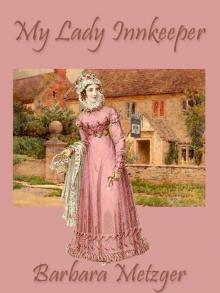 My Lady Innkeeper
My Lady Innkeeper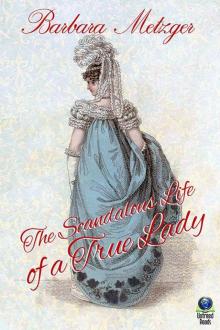 The Scandalous Life of a True Lady
The Scandalous Life of a True Lady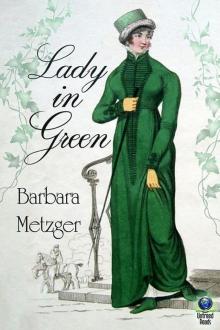 Lady in Green
Lady in Green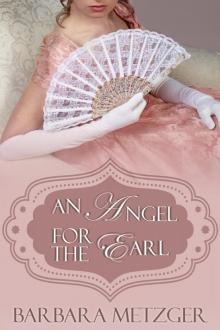 An Angel for the Earl
An Angel for the Earl Truly Yours
Truly Yours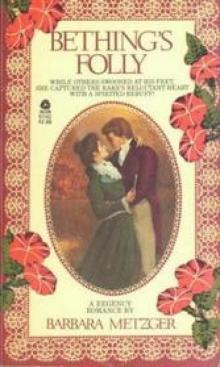 Bething's Folly
Bething's Folly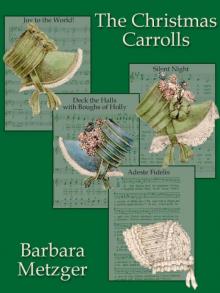 The Christmas Carrolls
The Christmas Carrolls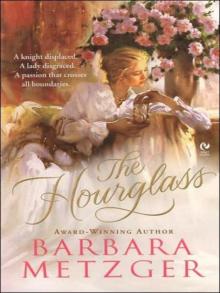 The Hourglass
The Hourglass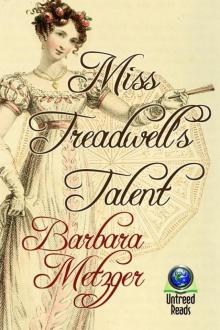 Miss Treadwell's Talent
Miss Treadwell's Talent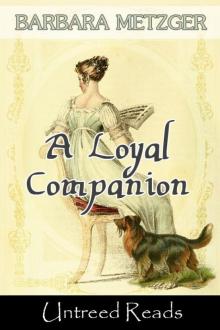 A Loyal Companion
A Loyal Companion Love, Louisa
Love, Louisa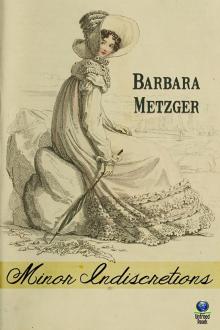 Minor Indiscretions
Minor Indiscretions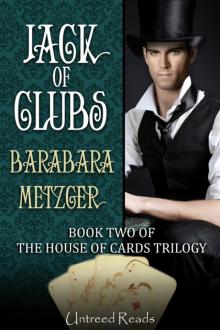 Jack of Clubs
Jack of Clubs An Enchanted Christmas
An Enchanted Christmas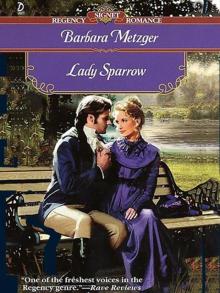 Lady Sparrow
Lady Sparrow Miss Westlake's Windfall
Miss Westlake's Windfall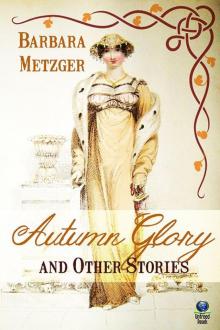 Autumn Glory and Other Stories
Autumn Glory and Other Stories Greetings of the Season and Other Stories
Greetings of the Season and Other Stories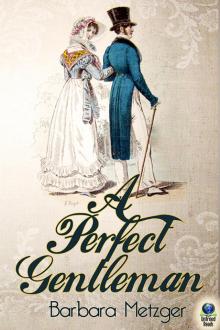 A Perfect Gentleman
A Perfect Gentleman